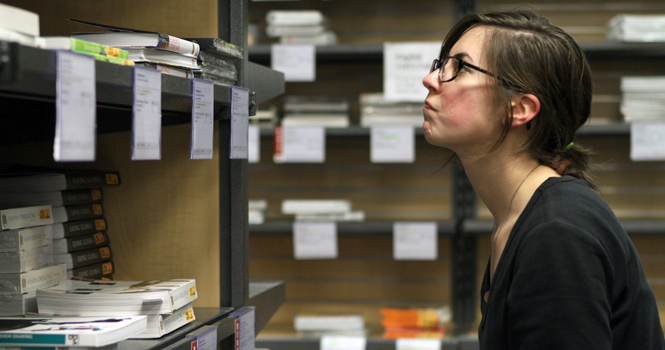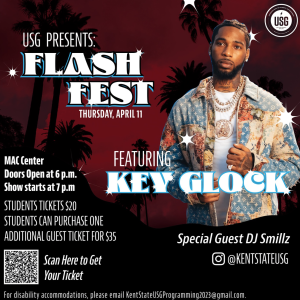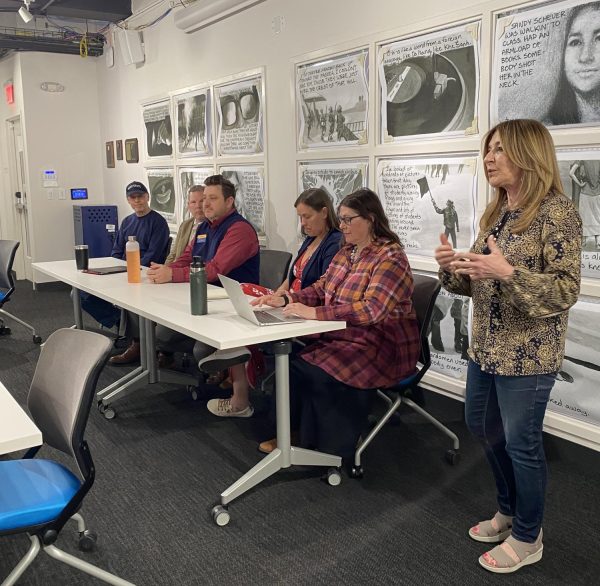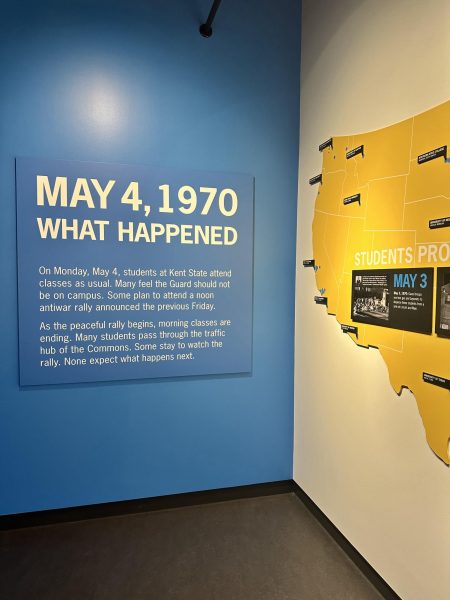Kent students have an array of textbook options
Adrienne Langan, 21-year-old fashion merchandising major, searches for a book at the campus book store in the Student Center on Tuesday. Students, with receipts, can return books for a full refund up until Jan. 17. Photo by Coty Giannelli.
January 11, 2012
It’s time to shake off that relaxing, three-week slumber known as winter break and begin the Spring 2012 semester. One of the first steps in preparation for the new semester is purchasing textbooks. As this year begins, students can take their pick and decide what outlet is best for their textbook needs.
Kent State University Bookstore:
On-campus convenience
The Kent State bookstore offers three options for students in need of textbooks: buying, renting and e-books.
“Renting is a good deal if you don’t plan on keeping the textbook,” said bookstore Director Mike Marquardt.
Renting a textbook costs about half the price of buying it new, he said.
“If you rent it, you can do the same thing you would if you owned it,” Marquardt said. “You can highlight it, makes notes, whatever. The important thing is that you get it back by the due date, May 5.”
Marquardt said the bookstore offers students convenience and a “liberal buyback policy,” which gives students until Jan. 17 to return textbooks with a receipt.
Students should utilize the campus bookstore because it is reliable, Marquardt said.
“You know you’re getting the right book, but if you go to Amazon, one of those places, you don’t know if it’s the right edition,” he said. “Plus, buying from the bookstore helps the university.”
The Kent State bookstore keeps textbooks in stock based on faculty orders, which tell the store what books the professor needs for class, Marquardt said. If a faculty member’s order is late, it may mean the required books will not be stocked in time for class.
At the end of the semester, students have the option of selling back their books. Marquardt said the best time to sell is before or during finals week.
“At that point, if the book has been what we call ‘adopted,’ which is ordered, for the following semester, we will pay back 50 percent of the new book price,” he said. “Otherwise, we pay wholesale, which is whatever the national market dictates.”
Marquardt said the Kent State bookstore does not buy back old editions of textbooks or books with no wholesale value.
If a student waits until after break to sell last semester’s books, “nine chances out of 10, you’re not going to get half price,” he said.
In that case, a student can drop the book in the donation bin outside the bookstore, Marquardt said.
facebook.com/kentstatebookstore
Renting
Pros:
- Less costly than buying
- Can treat it like a purchased book (make marks, etc.)
- Don’t have to worry about selling it back
Cons:
- Can only have the book for a specific amount of time
- If book is lost and/or not returned, student may have to pay a fee
Buying
Pros:
- Student owns book for as long as needed
- Can decide to sell it back
- Can keep it for another class or personal use
Cons:
- More costly than renting
- If a new edition comes out, student may not be able to sell back an older one.
Chegg.com:
Not just for textbooks
Chegg is a textbook resource website based in Santa Clara, Calif. that offers book options as well as course overviews and homework help.
“You can look up questions and our subject matter experts will be on the other end to help you,” said Angela Pontarolo, Chegg communications manager.
Pontarolo said students can view course and professor reviews, including average class grade distribution, on Chegg.
The site also offers textbook rentals. Books are due back at a date based on the purchase, not the end of the semester. Pontarolo said a student can purchase rental extensions in increments of 15, 30, 45 or 60 days. Extension costs depend on the book price and time frame needed.
“If they’re (students) looking to save money and do a core class, rent is always a fabulous option,” Pontarolo said. “Or if you want to buy a book, perhaps you’re looking to keep that book to reference it down the line. It depends on what the student needs and what the student wants.”
Pontarolo said textbooks on Chegg cost an average of 50 to 80 percent less than the list price.
“While we’re saving you money, we’re also helping you make money,” she said. “You can take notes at your school and make money selling your notes or study guide.”
Students can also make money by selling their books back to Chegg, Pontarolo said.
“We’re very lenient with our buyback policy but (how much Chegg will pay for a book) is dependent on the title itself,” Pontarolo said. “Most students sell at certain points in the year, but you can sell your books back at any time.”
Pontarolo said Chegg buys back textbooks based on the demand. If Chegg is not buying back a certain textbook, a student can choose to donate it through the Chegg for Good program.
“We help the environment, the community and the students,” Pontarolo said. “We donate (books) and plant trees. There is a variety of places we donate to.”
Bookbyte.com:
Small business with a big inventory
Oregon-based Bookbyte employs fewer than 50 people but makes its mark with a selection of 2 to 3 million textbooks.
“With how small we are, it’s really tough to be a major competitor with places like Amazon and Barnes and Noble,” said Tom Pittman, Bookbyte’s marketing analyst. “But we’ve done it over the course of the past decade.”
Bookbyte recently launched its textbook rental program, Pittman said. When students return their books after the 90-day rental period, Bookbyte offers a 10 percent cash rebate.
“Rental is really the way to go,” Pittman said. “It will save you even more money than just buying the book used and selling it back.”
If a student chooses to purchase a textbook from Bookbyte, he or she will save an average 40 to 50 percent off list price, Pittman said.
“We’ve always offered a great selection of used textbooks,” he said, “but one of our strongest advantages is buyback.”
Pittman said Bookbyte is a “pioneer” of textbook buyback programs.
The website bases its buyback prices off “many market factors,” he said. “Also, we offer cash. Some of the top tier competition will give you a good price, but it’s in-store credit.”
A student can view a cash quote for a textbook at Bookbyte. Pittman said this quote comes with a 30-day guarantee.
“The quote we give you is for a book in good, used condition, with a little bit of writing and slight wear,” he said. “We will reduce the price offered if it has worse wear.”
Bookbyte also buys back alternate editions of books, including instructors and annotated versions. When the website purchases books but cannot sell them again, it donates them through Rotary Books for the World, Pittman said.
“Our most recent shipment was 100,000 textbooks to the Philippines,” Pittman said. “These textbooks are in such huge demand in these countries.”
Pittman estimates Bookbyte has donated millions of textbooks through the charity. He said Bookbyte’s next step is to open the option for students to choose to donate a book through Bookbyte if the site cannot buy it back.
Until then, “one thing you can do is hold onto the textbook for maybe a term,” Pittman said, “and check to see next term if we’ll buy it back then.”
Contact Kelli Fitzpatrick at [email protected].

























